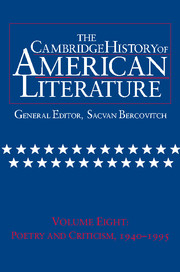Book contents
- Frontmatter
- Introduction
- Poetry, Politics, and Intellectuals
- Introduction
- 1 The Place of Poetry in the Culture, 1945–1950
- 2 Politics
- 3 Rear Guards
- 4 Avant-Gardes
- 5 Authenticity
- 6 Translation
- Conclusion: The Place of Poets, 1995
- Appendix I: Biographies of Poets
- Criticism since 1940
- Chronology 1940–1995
- Bibliography
- Index
1 - The Place of Poetry in the Culture, 1945–1950
from Poetry, Politics, and Intellectuals
Published online by Cambridge University Press: 28 March 2008
- Frontmatter
- Introduction
- Poetry, Politics, and Intellectuals
- Introduction
- 1 The Place of Poetry in the Culture, 1945–1950
- 2 Politics
- 3 Rear Guards
- 4 Avant-Gardes
- 5 Authenticity
- 6 Translation
- Conclusion: The Place of Poets, 1995
- Appendix I: Biographies of Poets
- Criticism since 1940
- Chronology 1940–1995
- Bibliography
- Index
Summary
In 1945 poetry occupied an altogether different position in the literary culture than it does now, a half-century later. In the winter of that year a critic in Partisan Review could plausibly claim: “no one will deny that the discussion of poetry is one of the highest proofs of civilization that a society can give.” Delmore Schwartz then named America’s most famous living poet, T. S. Eliot, a culture hero, “who brings new arts and skills to man-kind.” Poetry, painting, and jazz seemed to be the healthy arts; drama and fiction were ailing. (Literary criticism was thriving, but no one thought then to call it an art form.) Randall Jarrell, reviewing new books by Elizabeth Bishop, William Carlos Williams, and others, said that America had better poetry than it deserved, “how queer it is that our age should have poets like these.”
Young poets like Jarrell, Robert Lowell, and John Berryman, who moved in the literary circles of New York, enjoyed a special status within this culture. Their poems and reviews were published regularly in the most prestigious journals and, quite interestingly, the ideological differences between, say, Partisan Review and Sewanee Review, or the Kenyon Review did not matter for poets. Distinguished poet–critics Allen Tate and John Crowe Ransom edited two of these journals. The editors of the Partisan gave these young poets extraordinary latitude to range around in their critical reviews, though serious political differences might have separated Lowell, a conscientious objector, never a Marxist or an anti-Stalinist, from the explicitly engaged editors of this journal.
- Type
- Chapter
- Information
- The Cambridge History of American Literature , pp. 13 - 22Publisher: Cambridge University PressPrint publication year: 1996



